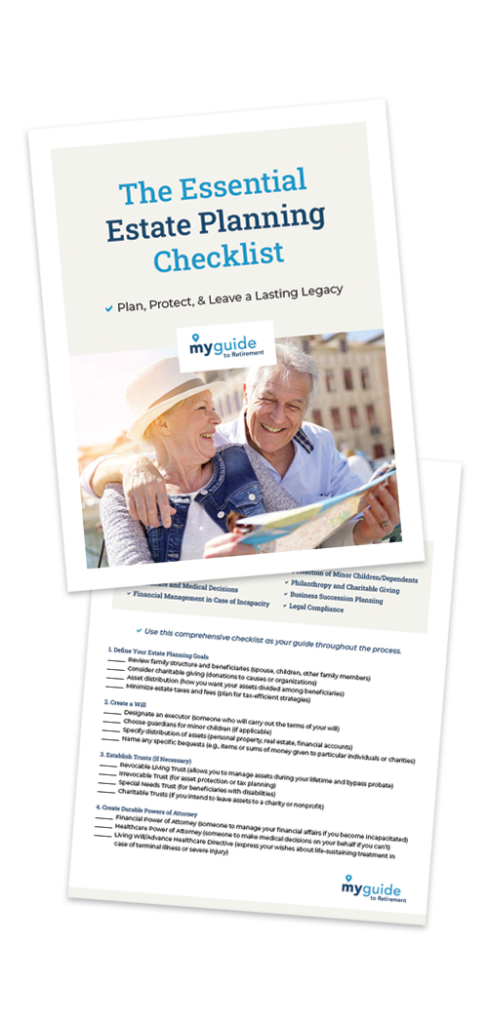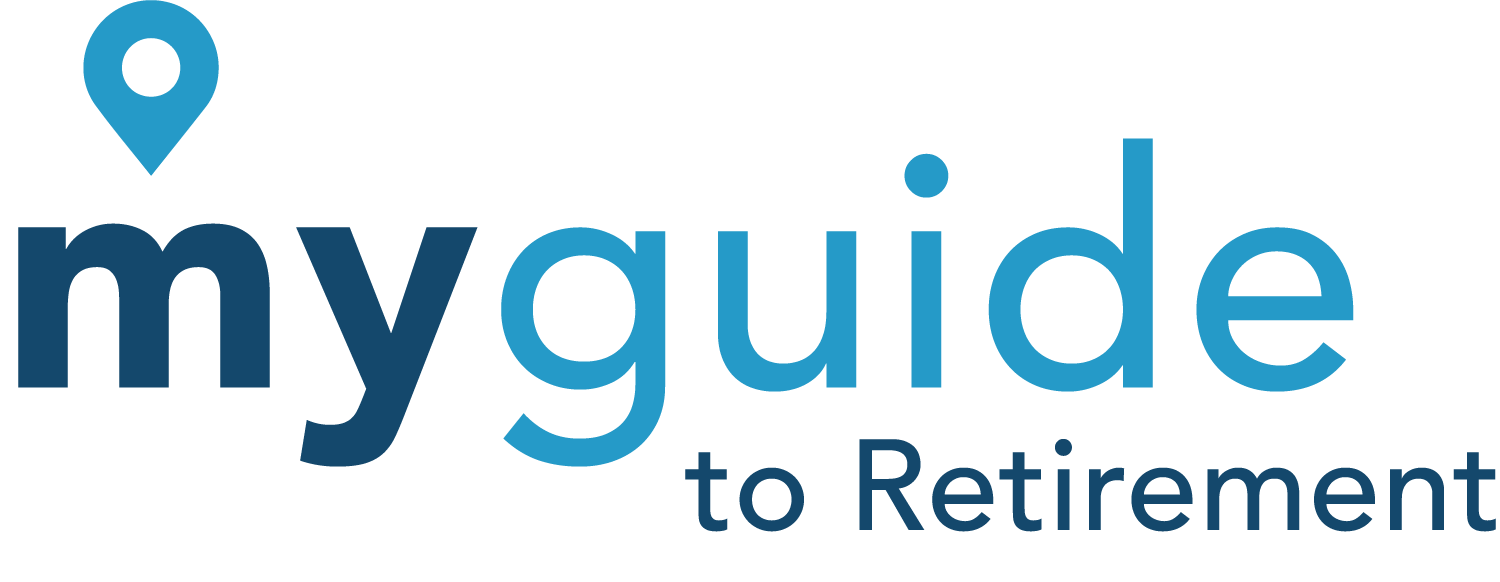Transform Longevity into Legacy
Do you imagine a retirement that leaves a lasting financial legacy—one that extends beyond your own needs and helps secure the dreams and futures of those you care about?
The most effective way to support your loved ones is by ensuring the wealth you’ve built is preserved and carefully structured to be passed down according to your wishes after you’re gone.
Transform Longevity into Legacy
Do you imagine a retirement that leaves a lasting financial legacy—one that extends beyond your own needs and helps secure the dreams and futures of those you care about?
The most effective way to support your loved ones is by ensuring the wealth you’ve built is preserved and carefully structured to be passed down according to your wishes after you’re gone.
Tax Savvy Estate Planning
Plan wisely for the distribution of your assets after you pass.
A carefully crafted estate plan not only safeguards your assets — it also ensures that your loved ones, charities, or other beneficiaries are well cared for, while minimizing taxes.
Explore strategies like trusts, gifting, charitable giving, and tax-deferred growth to reduce the tax burden on your beneficiaries and leave them with more of your legacy.
Maximize the Legacy You Leave Behind
Below are some key strategies involved in tax-savvy estate planning. Remember, consulting with an estate planning attorney or tax professional is essential to ensure your plan aligns with your state’s current tax laws and is tailored to your specific goals.
An estate tax is a tax on the transfer of assets from a deceased person to their heirs. The federal estate tax only applies if the estate exceeds a certain value, which changes periodically. As of 2024, estates valued over approximately $13 million (for individuals) are subject to federal estate tax. States also have their own estate or inheritance taxes, with thresholds that can be much lower.
Goal: The goal of tax-savvy estate planning is to reduce the taxable value of your estate, either by reducing the value of the assets subject to tax or by using various exemptions and strategies to ensure more wealth passes tax-free to your heirs.
A trust is a legal arrangement where a third party (a trustee) holds and manages assets on behalf of beneficiaries. Certain types of trusts, such as revocable living trusts or irrevocable trusts, can be key in reducing estate taxes.
- Revocable Living Trust: While it doesn’t offer direct tax savings (since you still control the assets), it allows for a smoother transfer of assets upon death, avoiding probate, which can reduce the time and cost of settling your estate.
- Irrevocable Trusts: By transferring assets into an irrevocable trust, you effectively remove those assets from your estate, reducing the value that will be taxed. This can significantly lower your estate tax liability. However, once assets are placed in an irrevocable trust, you no longer control them.
One of the most effective ways to reduce estate taxes is to give away assets before you pass. The annual gift tax exclusion allows you to gift up to a certain amount each year (for 2024, this amount is $17,000 per recipient) without incurring gift tax. Gifts above this amount may count against your lifetime estate tax exemption, but making gifts during your lifetime can reduce the size of your taxable estate and lower potential estate taxes.
- Lifetime Exemption: The federal government also allows individuals to gift up to $13 million during their lifetime without paying estate or gift taxes (for 2024). Gifting is often a great way to pass on wealth without triggering taxes if done wisely over time.
Life insurance can play a significant role in tax-savvy estate planning. The death benefit from a life insurance policy is generally not subject to income tax. However, if the policy is owned by your estate, the proceeds could be included in your taxable estate, potentially increasing your estate tax liability.
To avoid this, you can have the policy owned by a life insurance trust. The trust owns the policy, and the proceeds pass directly to your beneficiaries without being included in your estate for tax purposes.
Charitable donations can be a powerful way to reduce the size of your taxable estate. When you leave a portion of your estate to charity, that portion is generally not subject to estate taxes. Additionally, charitable remainder trusts (CRTs) can provide tax deductions while ensuring you receive income during your lifetime, with the remainder going to a charity upon your death.
- Donor-Advised Funds: Another way to reduce estate taxes is by donating to a donor-advised fund (DAF), where you can make tax-deductible contributions during your lifetime and then recommend charitable grants over time.
Certain accounts, such as IRAs, 401(k)s, and other retirement accounts, allow your investments to grow tax-deferred. When planning your estate, it’s important to consider how the tax burden on these accounts will be handled by your beneficiaries. Heirs of traditional retirement accounts will need to pay income tax on distributions, and there may be strategies to minimize this tax, such as stretch IRAs or Roth IRA conversions (where the tax is paid upfront).
When you pass assets to heirs, they generally receive a step-up in basis, meaning that the value of the asset is “stepped up” to its current market value at the time of your death. This can significantly reduce the capital gains taxes that your beneficiaries would otherwise owe if they sold the asset. For example, if you bought a property for $100,000 and it’s worth $300,000 at the time of your death, your heir inherits it with a basis of $300,000, so they would only pay taxes on any appreciation above that amount when they sell.
A Family Limited Partnership (FLP) allows you to transfer ownership of assets (such as real estate or business interests) to family members while maintaining control. This strategy often allows you to reduce the value of your estate through valuation discounts, since family members don’t have full control or marketability of the assets. This can be particularly useful for large estates or closely-held businesses.
Ensure that your beneficiary designations are up to date on accounts like retirement plans, life insurance, and bank accounts. These designations bypass probate, making the transfer of assets smoother and quicker. Furthermore, correctly allocating assets to beneficiaries may allow for better tax treatment. For example, naming a spouse as a beneficiary may provide tax advantages for them, whereas naming a trust might be beneficial for minor children.


The Essential Estate Planning Checklist
Make sure your wishes are honored and your loved ones are cared for with this free estate planning tool.
Creating Generational Wealth
Strategies like Annuities can provide guaranteed income for your heirs, while Indexed Universal Life (IUL) insurance offers both a death benefit and the potential for cash value growth tied to market performance. By incorporating these tools, you can ensure that your wealth continues to grow, providing financial stability and opportunities for generations to come.
- Contribute To A Lasting Legacy Post-Retirement
- Greatly Increase The Chances of Success for Future Generations
- Contribute To A Lasting Legacy Post-Retirement
- Greatly Increase The Chances of Success for Future Generations
Secure Your Assets & Protect Your Loved Ones
Protecting your beneficiaries from debt ensures their financial security when you’re no longer there to provide for them.
Choosing the right life insurance depends on your specific needs, such as how long you need coverage, your financial goals, and your risk tolerance.
Traditional Life Insurance offers beneficiaries a lump sum to cover expenses and maintain their lifestyle. Final Expense can help cover funeral and burial costs. A Mortgage Protection policy allows loved ones to stay in the family home by paying the mortgage if something happens to you — making it a valuable safety net for safeguarding your property and your loved ones’ living situation.
Always consult with a financial advisor to determine the best policy for your situation.
If you have a term life policy, it’s possible to...Read More
Have unpaid nursing home bills after a loved one dies?...Read More
Discover the best age to invest in burial insurance and...Read More
Our guide outlines the average funeral cost, including detailed breakdowns...Read More
Learn how final expense life insurance can ease the burden...Read More
Exploring the Different Types of Life Insurance
Below are some of the types of policies that can provide peace of mind by keeping your beneficiaries financially protected in your absence.
Term Life Insurance provides coverage for a specific period, such as 10, 20, or 30 years. If you pass away within that term, your beneficiaries receive a death benefit. If you outlive the term, the policy expires with no payout.
Best For: Those who need affordable coverage for a set period (e.g., to cover the years when children are dependent or mortgage payments are due).
Pros: Lower premiums, straightforward coverage.
Cons: No cash value or permanent coverage once the term ends.
Whole Life Insurance is a type of permanent life insurance that provides coverage for your entire life, as long as premiums are paid. It includes a savings or investment component (called “cash value”) that grows over time.
Best For: Individuals looking for lifelong coverage and who want a policy with both a death benefit and an investment feature.
Pros: Lifetime coverage, builds cash value that can be borrowed against or withdrawn.
Cons: Higher premiums than term life, cash value accumulation can be slow in the early years.
Universal Life Insurance is a flexible permanent life insurance policy that combines lifelong coverage with an investment savings component. You can adjust the death benefit and premium payments, and the cash value grows based on a credited interest rate.
Best For: Those who want flexible premiums and a combination of life insurance and investment options.
Pros: Flexible premiums and death benefits, cash value accumulation.
Cons: Interest rates can fluctuate, higher administrative fees, can be more complex to manage.
Indexed Universal Life Insurance (IUL) is a type of universal life insurance where the cash value is tied to a stock market index (such as the S&P 500). The growth of the cash value is capped at a certain rate, and the policy may offer a minimum guaranteed interest rate.
Best For: Those who want the potential for higher cash value growth linked to market performance but with a safety net (no loss if the market drops).
Pros: Potential for higher returns than traditional universal life, downside protection with a guaranteed minimum interest rate.
Cons: Caps on potential returns, can be complex to understand.
Guaranteed Issue Life Insurance is a type of permanent life insurance that doesn’t require a medical exam or health questions. It’s usually available to people between certain ages (typically 50-85), and the death benefit is often limited.
Best For: Those who may have health issues and cannot qualify for other types of life insurance.
Pros: No medical exam required, guaranteed approval.
Cons: Higher premiums, lower coverage amounts, limited payout in the first few years.
Final Expense insurance (aka Burial Insurance) is a type of whole life insurance designed to cover funeral, burial, and other end-of-life expenses. The death benefit is typically smaller than other types of life insurance, usually up to $35,000.
Best For: Older individuals who want to ensure that their funeral and other final expenses are covered without burdening their family.
Pros: Easy to qualify for, affordable premiums.
Cons: Lower death benefit, no investment component.
Mortgage Protection is a type of life insurance specifically designed to cover your mortgage payments if you’re unable to make them due to illness, disability, or death. The insurance policy pays out either a lump sum or a series of monthly payments directly to the lender, ensuring that your mortgage is paid off or that monthly payments continue even if you’re no longer able to work or if you pass away.
Best For: Homeowners who want to ensure their mortgage is paid off if they pass away or face an illness or disability, providing financial security for their family.
Pros: Provides peace of mind knowing your family won’t have to worry about losing the home due to an unpaid mortgage. The coverage is typically straightforward and affordable.
Cons: The policy only covers the mortgage and doesn’t offer broader financial protection. As the mortgage balance decreases over time, the death benefit may also reduce, which can leave less coverage as the years pass.
Create Lasting Memories & Leave A Legacy
Thoughtful estate planning isn’t about an ending — it’s about leaving a lasting legacy, supporting the people you love, and finding peace of mind knowing the future is secure and your wishes are in place.











